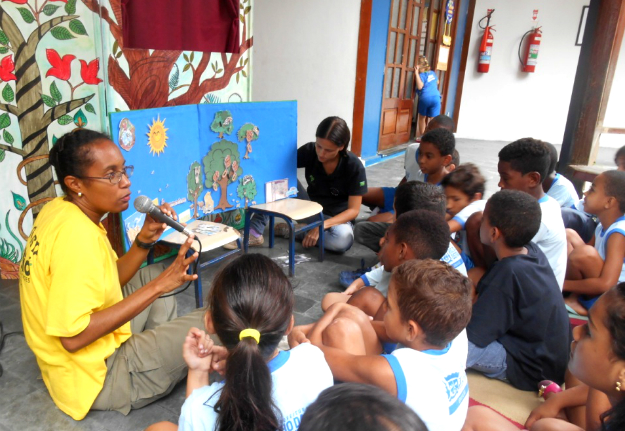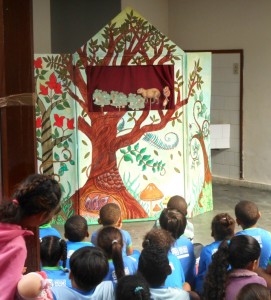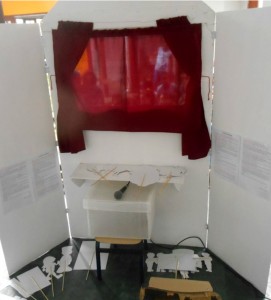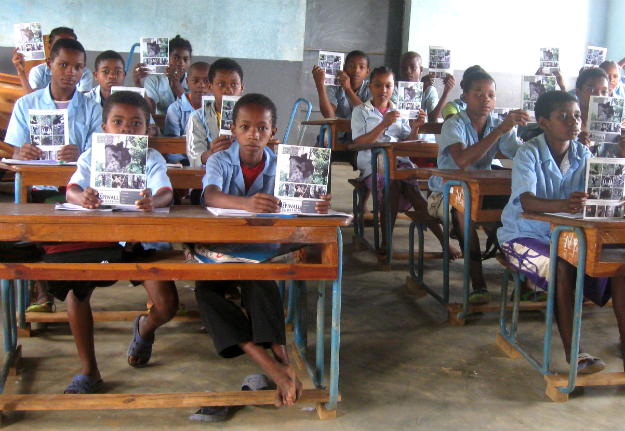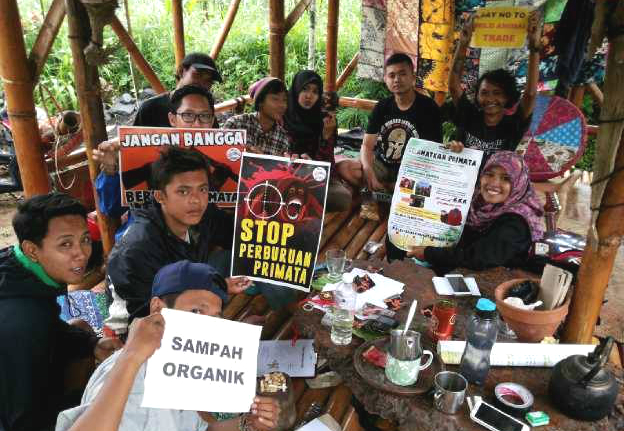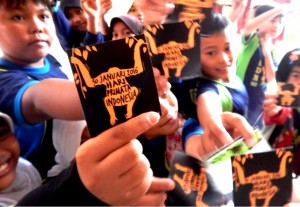Before the year comes to an end, we decided to check in with the winners of PEN’s Storytelling Challenge Prize Contest to see how they put their prize money to use and how winning the contest enabled them to continue educating local communities about primates and their natural habitats.
The purpose of PEN’s contest was to collect traditional and contemporary stories with a primate component. We were looking for successes in applying the art of storytelling to positively influence knowledge, attitudes, and behavior of communities in primate range countries.
PEN received entries from around the world when we announced the contest. Our judges faced the difficult task of choosing the winners and eventually selected the following three exceptional primate educators as our finalists: Aline Oliveira Santos, Maholy Ravaloharimanitra, and Swasti Mukti.
Each finalist was awarded $250 USD with support from Primate Connections for their education efforts. Read their project updates from the field below!
Aline Oliveira Santos, Instituto Pri-Matas para a Conservação da Biodiversidade
Brazil, Latin America
Aline constructs puppet theater and educates 142 children through storytelling to protect golden headed lion tamarins in Brazil’s Reserva Biológica União
Aline Oliveira Santos’ prizewinning story told of a golden headed lion tamarin family that is captured. After a frightening experience, they are returned to freedom in the forest of Brazil’s Bahia State. PEN judges praised her ability to tell of the real-life dangers facing the species in a way that was memorable for readers. Aline said of the award, “It was important to me because it highlighted the role of education through storytelling and valued my performance as an environmental educator.”
Her team used the prize money to construct a new children’s puppet theater (it took seven staff members to build!), as well as produce a golden headed lion tamarin storybook. So far, the children’s puppet theater has given two performances to 142 students and 10 teachers in the local schools closest to the Reserva Biológica União. Students also received copies of the storybook, pens, and keychains.
At the end of the puppet shows, Aline and her team delivered a questionnaire to evaluate if the students’ knowledge increased and attitudes changed about the reserve and tamarins. The performances resulted in students and teachers seeking out more information about the local primate populations, risks they face, and how the reserve is working toward conservation. Aline described it as “a very rich experience.”
Maholy Ravaloharimanitra, The Aspinall Foundation Madagascar
Madagascar, Africa
Maholy reaches 90 students and distributes educational materials to prevent the killing of lemurs wandering into rural villages in Madagascar
Maholy Ravaloharimanitra won the Africa regional prize for her oral storytelling of a traditional folktale about a boy and his father who are saved by a lemur when they encounter danger in the forest.
The prize money was used to pay salaries for Maholy and another teacher to visit three primary schools and deliver lessons about lemurs and their natural habitat for 90 students in Madagascar. It also covered costs for printing lemur storybooks, educational posters, drawing materials, and fuel to reach the schools. Maholy says that being able to print the storybooks was important because “finding a book in a remote village is difficult. Even if you find one, it is not in the language local people can understand.”
Giving the children something that they could keep gave them the chance to share what they had learned with family members. Reading stories and playing games in class reinforced what they learned on how to live in harmony with lemurs. Maholy said that, since implementing the education program, no lemurs wandering into the village have been killed, an indication of the community’s changing attitudes and behavior.
Swasti Mukti, ProFauna Indonesia
Indonesia, Asia
Swasti hosts an Indonesian Primate Day event, provides educational materials for hundreds of community members, and equips rangers with supplies to stop primate poaching in East Java, Indonesia’s Yang Highlands Wildlife Reserve
Swasti Mukti impressed PEN judges with her puppet theater fairytale about two princesses competing for the crown of their kingdom. One of the princesses wins, thanks to some help from a magical langur.
Swasti’s prize money helped to print and distribute posters (Stop Perburuan Primata Poster and Jangan Bangga Berburu Primata Poster), banners, and stickers for ProFauna's education program in communities near the Yang Highlands Wildlife Reserve in East Java, Indonesia. Despite their proximity to the reserve, many local children had no knowledge of the threats faced by Javan langurs. The materials also proved popular during the 2016 Indonesian Primate Day celebration, which reached hundreds of community members. This year’s theme and conservation message was “Stop Primate Poaching.”
Swasti said that winning the contest was very helpful since so often people want to make a difference in their local communities, but they lack the financial resources to do so. Distributing materials has both educated and motivated the local community to share what they have learned with friends and family. Swasti and the ProFauna team also used PEN’s prize money towards setting up their field office and equipping rangers with supplies to do regular patrols and increase protection of the langurs and other species in the reserve. Swasti said, “The PEN prize has been very important to me and my colleagues.”
PEN and our partner Primate Connections congratulates all three winners and thanks them for their continued efforts in primate conservation education.








